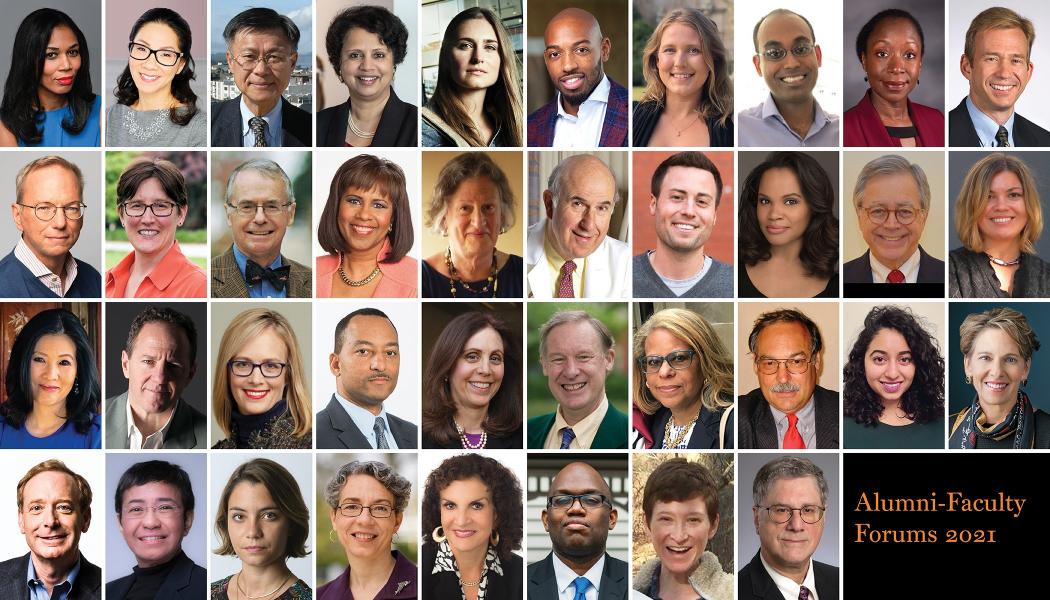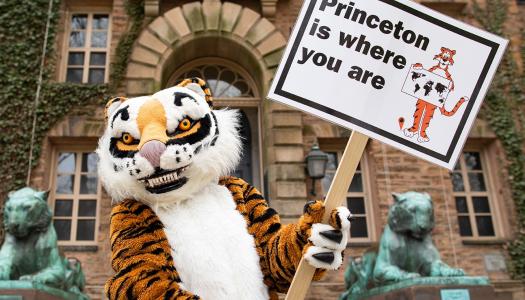
A Reunions tradition for over 40 years, the Alumni-Faculty Forums (AFFs) continued as a virtual experience this year, bringing together panelists from the major reunion classes and the Association of Princeton Graduate Alumni. Scholars, professionals, CEOs and other experts and leaders engaged in discussions of a broad range of timely or timeless topics, from Big Tech to U.S.-China relations to the future of American education.
Toward a More Perfect Union: Reckoning With the Past, Naming the Future, moderated by Michele Minter, Vice Provost for Institutional Equity and Diversity.
Panelists: John Milton Cooper, Jr. ’61, Gordon Fox Professor of American Institutions, Emeritus, University of Wisconsin-Madison; Edmund H. Driggs ’71, City of Charlotte, NC Councilman, District 7 Representative; Patricia Irvin ’76, President, Jenore Properties; Lasagne “L” Wilhite ’96, Director, Office of Employee Advocacy, U.S. House of Representatives; Dan-el Padilla Peralta ’06, Associate Professor of Classics, Princeton University
The panel discussed the opportunities and risks that are involved when the United States and institutions like Princeton University explore and talk about history in more inclusive ways. They debated the historical reconsideration of Woodrow Wilson and the recent decision by the University to remove his name from the School of Public and International Affairs because of his racist thinking and policies. “Prominent institutions like Princeton, our communities, our country have to pay attention to the symbols because they also send a message,” Patricia Irvin said. “Our statues, who we honor, who we commemorate matters.” Watch the entire conversation here.
U.S.-China Relations: From Engagement to Strategic Competition, moderated by Lynn White, Professor of Politics and International Affairs, Emeritus; Senior Scholar.
Panelists: Alice Lyman Miller ’66, Research Associate, Hoover Institution & Lecturer, East Asian Studies, Stanford University; Bing Shen ’71, Board Director, ECOVE Environment Corporation; Angie Tang ’91, Director of Executive Communications, East West Bank; Sheryl WuDunn *88, Partner, FullSky Partners
The panel examined the tensions that currently threaten U.S.-China relations and how those factors might escalate in the near future. As China expands its sphere of influence and asserts itself in a more aggressive foreign policy, the U.S. needs to weigh the costs of containment versus engagement. “My opinion is the United States cannot change China, cannot change China’s regime — but Chinese people can,” Alice Lyman Miller said. “And so by building contacts in China, encouraging constituencies who will find it in their interest to bring about change in China, we can bring about desirable change in China.” Watch the entire conversation here.
The Culture That Big Tech Built: What Comes Next?, moderated by Janet A. Vertesi, Associate Professor of Sociology
Panelists: Eric Schmidt ’76, Co-Founder, Schmidt Futures, Former Google CEO and Chairman; Brad Smith ’81, President and Chief Legal Officer, Microsoft Corporation; Jennifer Rexford ’91, Gordon Y.S. Wu Professor of Engineering and Chair of Computer Science, Princeton University; Tshaka Cunningham ’96, Chief Science Officer & Founder, TruGenomix Inc.; Jack Altman ’11, CEO, Lattice
Executives and academics took a hard look at the culture of Big Tech, pointing out its shortcomings when it comes to racial and gender diversity and discussing the need to ensure that no group gets left behind in the name of progress or profit. Can regulation keep up with the pace of AI advances? “I fundamentally think that the 2020s will bring to technology what the 1930s brought the banks,” said Brad Smith, referring to that era’s regulatory guardrails. “I look to the next five years and say, we should worry about how bad it can become, but we should be optimistic about what it can create in terms of new benefits that will, I think, solve some problems that need to be solved, instill public confidence in technology that is so important in the world today.” Watch the entire conversation here.
Sustainability Now: Changing the Way We Do Business, moderated by Anu Ramaswami, Sanjay Swani ’87 Professor of India Studies; Professor of Civil and Environmental Engineering, the Princeton Institute for International and Regional Studies, and the High Meadows Environmental Institute; Director, Chadha Center for Global India
Panelists: Mark D. Levine ’66, Emeritus Director, Energy Division and the China Energy Group, Lawrence Berkeley National Lab; Thomas P. Lyon ’81, Professor, Ross School of Business, University of Michigan; Melissa Waage ’01, National Campaign Director, Natural Resources Defense Council; Lauren Bush Lauren ’06, CEO and Founder, FEED
The panelists shared their experiences and efforts to create sustainable practices in the business world, from working with the Chinese government to improve energy efficiencies, to creating a business to provide meals to those suffering from food scarcity, to creating laws and policy to limit or reverse the harmful effects on the environment. The pandemic is a challenge, but it also presents an enormous opportunity. “We have an amazing opportunity through job creation legislation at the federal level … to help erase some of this inequity at the same time as we are supercharging our deployment of clean power and clean transportation and water infrastructure,” Melissa Waage said. “We have to fix our environmental problems, but that can only be fixed when we’re fixing our social justice problems as well.” Watch the entire conversation here.
Civil Society and the Attack on Journalism, moderated by Kimbriell Kelly, Visiting Lecturer, Council of the Humanities; Ferris Professor of Journalism
Panelists: Melanie Lawson ’76, News Anchor and Reporter, Disney/ABC Affiliate, Houston; Maria A. Ressa ’86, President & CEO, Rappler; Laura Coates ’01, Senior Legal Analyst, CNN; Natalie Kitroeff ’11, Foreign Correspondent, The New York Times; Sarah Qari ’16, Producer, Radiolab at WNYC Radio
A quintet of accomplished female journalists discussed the future of their industry at a time when governments around the world — including the U.S. — have attacked the media’s credibility as a means of maintaining power. “When it’s a battle of facts, journalism becomes activism,” said Maria Ressa, whose reporting in the Philippines has made her a target of its government. “People are being manipulated, our world views are getting changed, and trust is being torn apart.” Natalie Kitroeff has witnessed similar developments in Mexico. “Our job is to ask tough questions … and that often puts us in direct conflict with people in power,” she said. “The question of the truth and the question of who gets to tell it is a furious debate.” Watch the entire conversation here.
Future Learning: American Education in a Post-Pandemic World, moderated by Marta Tienda, Maurice P. During Professor in Demographic Studies, Professor of Sociology and Public Affairs, Princeton School of Public and International Affairs
Panelists: John Katzman ’81, CEO, Noodle Education; Leslie-Bernard Joseph ’06, CEO, Coney Island Prep; Stevie Peacock ’16, Transformation Coach, Middle Grades Literacy, Miami-Dade County Public Schools; Kathryn A. Foster *93, President, The College of New Jersey
Education leaders from public and private schools engaged in a riveting discussion about the themes of equity and achievement gaps, lessons from virtual and hybrid instruction, uses and misuses of assessments, and what the post-pandemic recovery portends for the future of American education. “Technology is both a game changer and it is not the solution; it is necessary, but not sufficient,” Leslie-Bernard Joseph said. “One thing that we have absolutely learned during this pandemic is that teaching and learning is a social endeavor. Teachers are not replaceable. You actually need the experience of learning and struggling and talking and questioning with your peers, and that human interaction, that human connection is really, really important.” Watch the entire conversation here.
The Aftermask: How COVID-19 Will Change Public Health, moderated by Laura H. Kahn *02, Research Scholar, Program on Science and Global Security, Princeton School of Public and International Affairs
Panelists: Gilbert S. Omenn ’61, Harold T. Shapiro Distinguished Professor, University of Michigan; Bruce S. Ribner ’66, Professor of Medicine, Emory University School of Medicine; Principle Investigator, National Emerging Special Pathogens Training and Education Center; Medical Director, Emory Serious Communicable Diseases Unit; Melissa S. Marks ’86, Medical Director, Princeton University Health Services; Vinayak Venkataraman ’11, Resident Physician, Massachusetts General Hospital
This conversation among five medical professionals discussed the interplay between public health and medicine during the time of COVID. The panelists shared their thoughts on the importance of more public health training for practitioners, what they felt were some of the failings of organizations such as the CDC in the early part of the pandemic, and why the U.S. wasn’t well-prepared to deal with this virus. “The original political approach was to minimize this outbreak, and how do you minimize the outbreak on the one hand and tell everybody they need to be masking every time they're within six feet of someone else,” Bruce Ribner said. “And I think those two phenomena led to the very delayed recognition that face masks and N95 masks really were so critical in controlling the transmission of this infectious disease.” Watch the entire conversation here.

